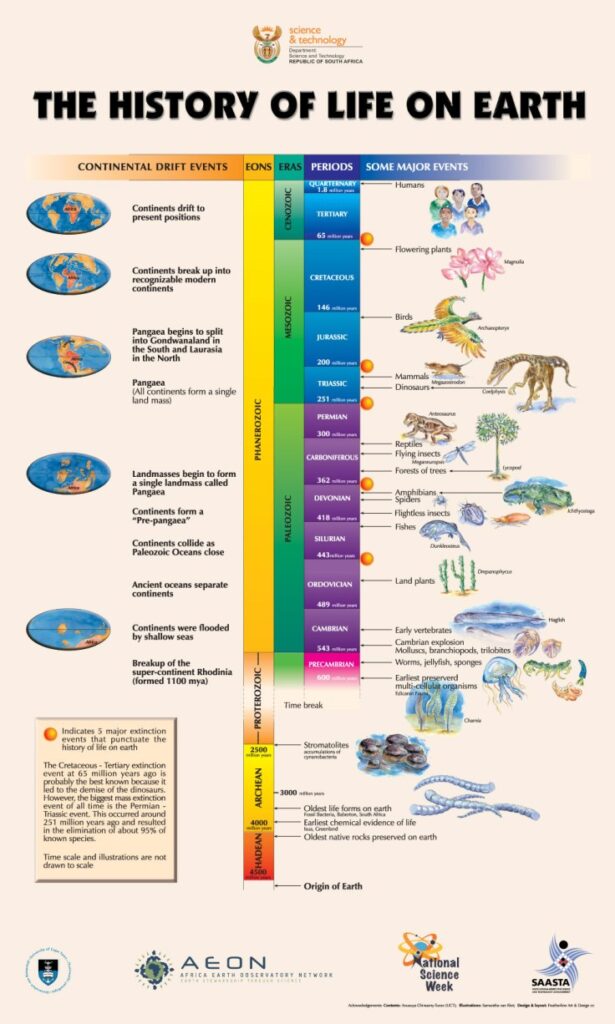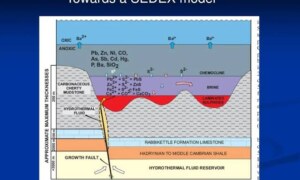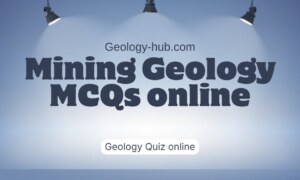
Geological Time Scale
The geological time scale is a system of chronological measurement that relates geological events and geological time to a numerical scale. It is used to describe the timing and relationships between events that have occurred throughout Earth’s history. The time scale is divided into four main parts: Eons, Eras, Periods, and Epochs.
The current geological time scale is based on the relative ages of rock layers and the fossils contained within them. The boundaries between different periods and epochs are marked by significant geological events such as mass extinctions or changes in the climate. The time scale is constantly being refined as new data becomes available from geological and paleontological research.
The following is a brief overview of the divisions of the geological time scale, listed from oldest to youngest:
- Eon: The largest division of geological time. There are two eons: the Archean (4.0 to 2.5 billion years ago) and the Proterozoic (2.5 billion to 541 million years ago).
- Era: The second-largest division of geological time. There are three eras: the Paleozoic (541 to 252 million years ago), the Mesozoic (252 to 66 million years ago), and the Cenozoic (66 million years ago to present).
- Period: A subdivision of an era. There are eleven periods in the Phanerozoic Eon (the most recent eon), including the Cambrian, Ordovician, Silurian, Devonian, Carboniferous, Permian, Triassic, Jurassic, Cretaceous, Paleogene, and Neogene.
- Epoch: A subdivision of a period. There are numerous epochs within each period, with varying durations depending on the time period and the region.
Full detail about geological time scale
The geological time scale is a framework for understanding the history of the Earth and the evolution of life on our planet. It is divided into several hierarchical units of time, each with its own distinct geological and biological characteristics. The time scale is based on the relative ages of rocks and the fossils they contain, as well as other physical and chemical evidence of past geological events.
Eon: The largest division of geological time is an eon. The current eon is the Phanerozoic, which began about 541 million years ago and continues to the present day. The Phanerozoic eon is divided into three eras: the Paleozoic, the Mesozoic, and the Cenozoic. Before the Phanerozoic eon, there were two earlier eons: the Archean and the Proterozoic.
- Archean Eon: This eon lasted from about 4 billion years ago to 2.5 billion years ago. During this time, the Earth’s surface was largely molten, and volcanic activity was intense. The earliest life forms appeared during this eon, including simple bacteria and cyanobacteria.
- Proterozoic Eon: This eon lasted from about 2.5 billion years ago to 541 million years ago. The Earth’s atmosphere and oceans continued to evolve, and more complex life forms appeared, including multicellular organisms and primitive animals.
Era: The second-largest division of geological time is an era. There are three eras in the Phanerozoic eon:
- Paleozoic Era: This era lasted from about 541 million years ago to 252 million years ago. During this time, the Earth’s continents began to take shape, and the first fish, amphibians, reptiles, and insects appeared. The Paleozoic era ended with the largest mass extinction in Earth’s history, known as the Permian-Triassic extinction.
- Mesozoic Era: This era lasted from about 252 million years ago to 66 million years ago. The Mesozoic era is sometimes called the Age of Reptiles because dinosaurs dominated the land, and birds and mammals began to evolve. The era ended with the mass extinction of the dinosaurs, likely caused by an asteroid impact.
- Cenozoic Era: This era began about 66 million years ago and continues to the present day. The Cenozoic era is sometimes called the Age of Mammals because it is marked by the diversification and expansion of mammals, including humans. The era is divided into two periods: the Paleogene and the Neogene.
Period: A period is a subdivision of an era. There are 11 periods in the Phanerozoic eon:
- Cambrian Period: This period lasted from about 541 million years ago to 485 million years ago. It is known for the rapid diversification of life forms, including the appearance of most major groups of animals.
- Ordovician Period: This period lasted from about 485 million years ago to 443 million years ago. It is characterized by the appearance of the first vertebrates, as well as the first land plants and fungi.
- Silurian Period: This period lasted from about 443 million years ago to 419 million years ago. It is known for the diversification of marine life, including the first jawed fish and the first land animals, such as scorpions.
- Devonian Period: This period lasted from about 419 million years ago to 359 million years ago. It is known for the evolution of complex plants, such as ferns and trees, and the first amphibians.
- Carboniferous Period: This period lasted from about 359 million years ago to 299.
| Time | Event |
|---|---|
| 4.6 billion years: | The Sun formed from the gravitational collapse of a region within a large molecular cloud. Most of the matter gathered in the center (Sun), while the rest flattened into an orbiting disk that became the Solar System (Mercury, Venus, Earth, Mars, Jupiter, Saturn, Uranus, Neptune).Sun was about 70% as bright as today.Our solar system is currently orbiting at around 24,000–26,000 light-years from the galactic center of the Milky Way, completing one orbit in about 225–250 million years.The distance of the Sun from Earth is approximately 149.6-million kilometers. At this average distance, light travels from the Sun to Earth in about 8 minutes and 19 seconds. |
| 4.5 billion years: | Earth collided with a planetoid the size of Mars. Fragments orbited Earth and formed the Moon.At this time, moon was orbiting at about 64,000 km from Earth. Earth did not yet have water. |
| 3.9 billion years: | Meteorites bombarded Earth bringing along water and other elements. The earth’s atmosphere became mostly carbon dioxide, water vapor, methane, and ammonia. |
| 3.8 billion years: | The surface of Earth changed from molten to solid rock. Water started condensing in liquid form. Earth day was 15 hours long. |
| 3.6 billion years: | First simple cells, oxygen producing bacteria. |
| 3.4 billion years: | Stromatolites demonstrated photosynthesis; a process used by plants and other organisms to convert light energy captured from the sun into chemical energy. |
| 2.2 billion years: | Organisms with mitochondria capable of aerobic respiration appeared. |
| 2.0 billion years: | Meteor impact, 300 km crater in South Africa. |
| 1.8 billion years: | Meteor impact, 250 km crater in Ontario, Canada. |
| 1.6 billion years: | Complex single-cell life appeared. |
| 1.5 billion years: | Organisms with complex cells containing nucleus appeared. |
| 1.2 billion years: | Sexual reproduction appeared, increasing the rate of evolution. |
| 1.0 billion years: | Multicellular life appeared. |
| 900 million years: | Earth day was now 18 hours long. Moon was about 350,000 km from Earth. |
| 650 million years: | Snowball Earth, the entire Earth was covered in ice for many million years.Mass extinction of 70% of dominant sea plants. |
| 590 million years: | Meteor impact, 90 km crater in Acraman, South Australia. |
| 580 million years: | Simple, soft-bodied organisms developed i.e. Jellyfish.The accumulation of atmospheric oxygen allowed the formation of the ozone layer. This blocked ultraviolet radiation, permitting the colonization of the land.The ozone layer is found at approximately 20 to 30 kilometres (12 to 19 miles) above Earth, it absorbs 97–99% of the Sun’s medium-frequency ultraviolet light which potentially damages exposed life forms. |
| 570 million years: | Arthropods appeared, ancestors of insects. |
| 560 million years: | Earliest fungi. |
| 530 million years: | The fish appeared. Major diversification of living things in the oceans. |
| 443 million years: | Mass extinction, 49% of life disappeared. |
| 434 million years: | The first primitive plants moved onto land, having evolved from green algae living along the edges of lakes. They are accompanied by fungi, which may have aided the colonization of land through symbiosis. |
| 410 million years: | Fish developed teeth and jaws.Spiders, Centipedes appeared. |
| 374 million years: | Mass extinction, 70% of marine species disappeared. |
| 370 million years: | First amphibians, ancestors of frogs, toads, etc… |
| 360 million years: | Crabs appeared. |
| 363 million years: | Insects roamed the land and would soon take to the skies; sharks swam the oceans as top predators, and vegetation covered the land, with seed-bearing plants and forests soon to flourish. |
| 340 million years: | Diversification of amphibians. |
| 280 million years: | Beetles appeared. |
| 320 million years | Reptiles appeared. |
| 251 million years: | Mass extinction event, up to 95% of ocean species and 70% land species lost. |
| 225 million years: | First small dinosaurs appeared. |
| 220 million years: | Forests dominated the land. |
| 201 million years: | Mass extinction, 20% of all marine species killed; caused by oceanic anoxic event. |
| 200 million years | Mammals appeared. |
| 150 million years: | Birds appeared. |
| 130 million years | Flowering plants evolved with structures that attract insects and other animals to spread pollen. This innovation causes a major burst of animal evolution through co-evolution. First freshwater pelomedusid turtles. |
| 110 million years: | Crocodiles appeared. |
| 100 million years | The first bees evolved. |
| 90 million years: | Snakes appeared. |
| 80 million years: | Ants appeared. |
| 68 million years: | Tyrannosaurus rex, the largest terrestrial predator of North America thrived. |
| 65 million years: | Meteor impact, 170 km crater Chicxulub, Yucatan, Mexico.Mass extinction of 80-90% of marine species and 85% of land species.Dinosaurs became extinct. Mammals became dominant species. Rapid diversification in ants. |
| 55 million years: | Whale appeared. |
| 52 million years: | Bats appeared. |
| 40 million years: | Modern-type butterflies appeared. |
| 30 million years: | Pigs and Cats appeared. |
| 25 million years: | Deer appeared. |
| 20 million years: | Giraffes, Hyenas, Bears appeared.Increase in bird diversity. |
| 15 million years: | Kangaroo appeared. |
| 14 million years: | The first great apes appeared. |
| 10 million years: | Grasslands and savannas established.Diversity in insects, especially ants and termites.Horses increased in body size and developed high-crowned teeth.Major diversification in grassland mammals and snakes. |
| 5 million years: | First tree sloths and hippopotami, diversification of grazing herbivores like zebras and elephants, large carnivorous mammals like lions and dogs, burrowing rodents, kangaroos, birds, and small carnivores, vultures increase in size, decrease in the number of perissodactyl mammals. |
| 4.4 million years: | Appearance of Ardipithecus, an early Hominin Genus. |
| 4 million years: | North and South America joined at the Isthmus of Panama. Animals and plants cross the new land bridge.Ocean currents changed in the newly isolated Atlantic Ocean. First modern elephants, giraffes, zebras, lions, rhinos and gazelles appear in the fossil record. |
| 3.9 million years: | Appearance of Australopithecus, Genus of Hominids. |
| 3.7 million years: | Australopithecus Hominids inhabited Eastern and Northern Africa. |
| 2.7 million years: | Evolution of Paranthropus. |
| 2.4 million years: | Homo Habilis appeared. |
| 2.1 million years: | Yellowstone supervolcanic eruption. |
| 2 million years: | Tool-making Humanoids emerged.Beginning of the Stone Age, lasted several million years. |
| 1.7 million years: | Homo Erectus first moved out of Africa. |
| 1.3 million years: | Yellowstone supervolcanic eruption. |
| 1.2 million years: | Evolution of Homo antecessor. The last members of Paranthropus died out. |
| 700,000 years: | Human and Neanderthal lineages started to diverge genetically. |
| 640,000 years: | Yellowstone supervolcanic eruption. |
| 600,000 years: | Evolution of Homo Heidelbergensis. |
| 530,000 years: | Development of speech in Homo Heidelbergensis. |
| 400,000 years: | Hominids hunted with wooden spears and used stone cutting tools. |
| 370,000 years: | Human ancestors and Neanderthals were fully separate populations. |
| 350,000 years: | Evolution of Neanderthals. |
| 300,000 years: | Hominids used controlled fires.Neanderthal man spread through Europe |
| 200,000 years: | Anatomically modern humans appeared in Africa. |
| 105,000 years: | Stone age humans foraged for grass seeds such as sorghum. |
| 80,000 years: | Non-African humans interbreed with Neanderthals. |
| 60,000 years: | Oldest male ancestor of modern humans. |
| 40,000 years: | Cro-Magnon man appeared in Europe. |
| 30,000 years: | Neanderthals disappeared from fossil record.First domestic dogs. |
| 15,000 years: | Bering land bridge between Alaska and Siberia allowed human migration to America. |
| 12,000 years: | Fired pottery invented. |
| 9,000 years: | Metal smelting started. |
| 5,500 years: | Invention of the wheel. |
| 5,300 years: | The Bronze Age. |
| 5,000 years: | Development of writing. |
| 4,500 years: | Pyramids of Giza. |
| 3,300 years: | The Iron Age. |
| 2,230 years: | Archimedes advanced mathematics. |
| 250 years: | Start of the Industrial Revolution. |
| 50 years: | Space travel. |
| Year 1957: | Satellites orbited Earth. |
| Year 1969 | Human walked on the surface of the Moon. |


Leave a comment